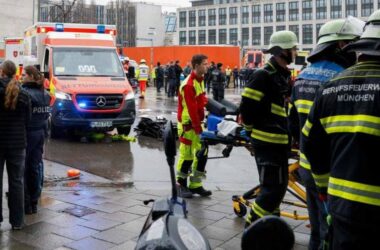Fresh data from Berlin’s chaotic New Year’s Eve riots reveals that 40% of those arrested lack German passports, a proportion far higher than the city’s 24% foreign population.
Additionally, a leaked list of suspects’ names, dominated by non-German forenames, has reignited debates about immigration, crime, and integration.
The Berlin Police updated their crime tally to 1,453 incidents, with 44 officers injured and 670 suspects identified. Among them, 406 hold German citizenship, while 264 are foreign nationals. However, the term “German” in these statistics includes naturalized citizens, obscuring migrant backgrounds. A leaked list of forenames, published by Nius, shows names like Abdul Kerim, Hassan, and Mohammed appearing repeatedly among those labeled as German citizens. According to Nius, 65% of these “German” suspects have clearly non-German names.
Turks and Afghans were particularly overrepresented among the foreign nationals arrested. One notable case involves 23-year-old influencer Atallah Younes, a Palestinian born in the West Bank with a Jordanian passport. Younes allegedly fired a rocket into a child’s bedroom and was later detained at Berlin Brandenburg Airport. Speaking to Bild before his arrest, he claimed ignorance of the danger, saying, “I didn’t know it was so dangerous… I went to sleep and the next day I saw that the video had 10 million views.”
Viral footage of the riots captured scenes of fireworks being aimed at police, bystanders, and even residential buildings. Meanwhile, Berlin’s State Health Senator Ina Czyborra (SPD) reported 23 cases of healthcare workers being physically or verbally attacked, describing the violence as “the usual level.”
The Alternative for Germany (AfD) party quickly demanded transparency, pressing for the release of suspects’ names to clarify discrepancies between official nationality data and migrant origins. While the state constitutional court rejected their request, the leaked Nius list has intensified scrutiny. AfD leader Kristin Brinker dismissed claims that the violence stemmed from celebration, blaming “immigrant groups from problem areas” and calling it evidence of “failed migration policy.”
AfD co-leader Alice Weidel shared the leaked names on social media, asserting that violent offenders should “forfeit their right to hospitality and be deported.” Weidel also described the riots as “civil war-like conditions,” advocating stricter immigration controls.
These incidents highlight the challenges of integrating immigrant communities and addressing crime in certain neighborhoods. With federal elections looming and the AfD poised to become Germany’s second-largest party, the debate over immigration and public safety is only heating up. However, the cordon sanitaire maintained by legacy parties is expected to block the AfD from power, even as the political landscape shifts.




